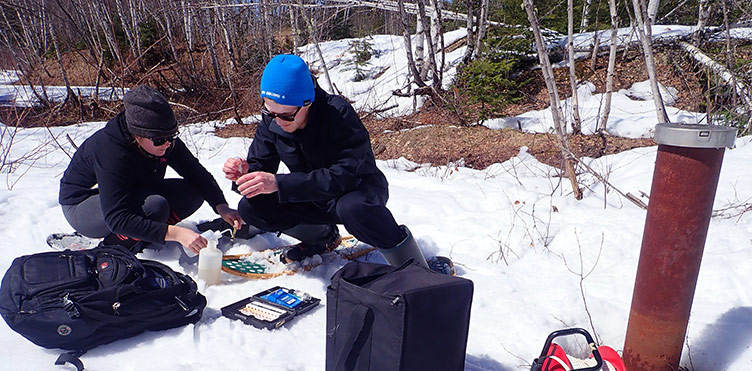Environmental Sciences
Faculty: Faculty of Science
Degree(s): Bachelor of Science
Campus: Fredericton

Do you want to explore and understand the impacts of humans on the environment and of the environment on humans? Do you want to learn to use the scientific approach to solve environmental problems?
Navigating the complex issues involved is a challenge that requires a broad range of skills and perspectives pertaining to earth’s environmental system: its biosphere, atmosphere, hydrosphere and geosphere. This type of training is brought together at the University of New Brunswick through our interdepartmental programs in the environmental sciences.
Bachelor of Science
The Faculty of Science is one of the university’s oldest faculties and was established when UNB was founded in 1785. The Environmental Sciences program is available as a major or honours option as part of a four-year Bachelor of Science degree. It is offered jointly by all of the departments in the faculty. There is no minor program available in Environmental Sciences.
Six streams to choose from
Undergraduate programs in the environmental sciences encompass knowledge gleaned from all science departments and commence with a common core similar to that of other students in the Faculty of Science. This introduction provides the student with a theoretical and experiential grounding in scientific principles. As the program progresses, students advance to consider environmental issues from broader ethical, economic and social viewpoints while developing their own scientific interests with a more specific collection of required and elective advanced courses.
These advanced science courses are tailored for students to graduate with a concentration (i.e., stream) in one of six areas. All streams are supported by a strong science foundation and an examination of the environment from different perspectives.
Biological responses to the environment
Living organisms are constantly interacting with their environment and changing in response to it. At relatively small time-scales, individuals do this biochemically, physiologically and behaviourally; at large time-scales, populations do this by adapting. At a time when our planet is being transformed by human activities, it is important to understand how living entities can or cannot respond to such changes. This stream focuses on a deep knowledge of the various life forms on our planet and their responses at all levels (molecular, cellular, organismal, population and community) to the environment.
Chemical environmental perspectives
Understanding the properties and reactivity of molecules, in addition to their identification and quantification, is at the heart of understanding and mitigating human impact on the environment. This knowledge is essential for monitoring industry, investigating and solving environmental problems, and creating paths for human activity that are less harmful to the environment. This stream focuses on training in chemistry.
Environmetrics
The amount of data collected for sampling and monitoring the environment is on the rise, as many different monitoring technologies are developed and used. Consequently, there is a need for trained personnel to develop and use mathematical, statistical and other quantitative methods in the environmental sciences, environmental engineering, and environmental monitoring and protection. This stream focuses on in-depth mathematical and statistical training.
Responsible resource recovery
For society to continue to function, extraction of our gradually depleting geologic resources will remain a necessity (e.g., aggregate, fertilizer, metal, petroleum and water for agriculture, communications, construction, lubricants, plastics, renewable energy, transport). The next generation of scientists must not only carefully manage these dwindling resources, but also explore and extract them with much greater awareness and consideration of both the risk of environmental degradation and pollution, and the subsequent management of waste material. This stream provides the student with knowledge and understanding of a broad range of environmental and socio-economic issues and how such issues relate to the science of geologic resources.
Water-Earth interaction
Across our environment, water has the capacity to dissolve solids from the earth’s surface and substrate, transport the solutes, and precipitate new materials. The solutes can be essential nutrients for life, or toxic contaminants. When flowing as surface- or ground-water, it may also remove, move, and deposit solid material. This stream provides the student with the relevant science underpinning the global water supply and water quality, river and coastal erosion, and siltation. Electives allow students to further investigate any interest in hydrogeochemistry, biosphere interactions or water management.
Sun-Earth interaction
Among the many challenges that humanity faces at this beginning of the 21st century are concerns arising from climate change and various impacts on societies resulting from the interaction of Earth with the Sun. To face these challenges requires advancement of our knowledge and understanding of the dynamics of the Sun and its effects on the Earth’s magnetosphere, ionosphere and atmosphere. The goal of this stream is to provide a curriculum that will focus on the study of various physical processes taking place in the solar-terrestrial environment, and quantify the energy transport mechanisms that drive life on planet Earth.
Admission requirements
For admission requirements, select "Science" in our admission requirements tool. Contact sci.connect@unb.ca if you are interested in this program.
Careers
- Government and education
- Conservation and non-profits
- Meteorology and climatology
- Water and waste treatment
- Site mitigation and remediation
